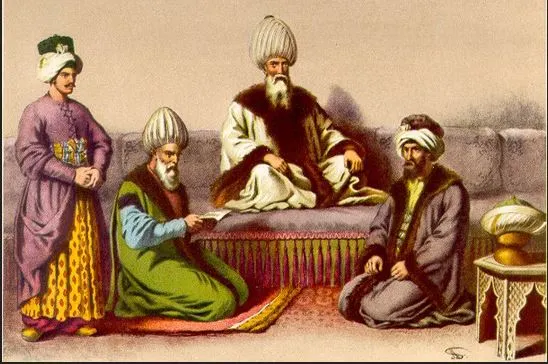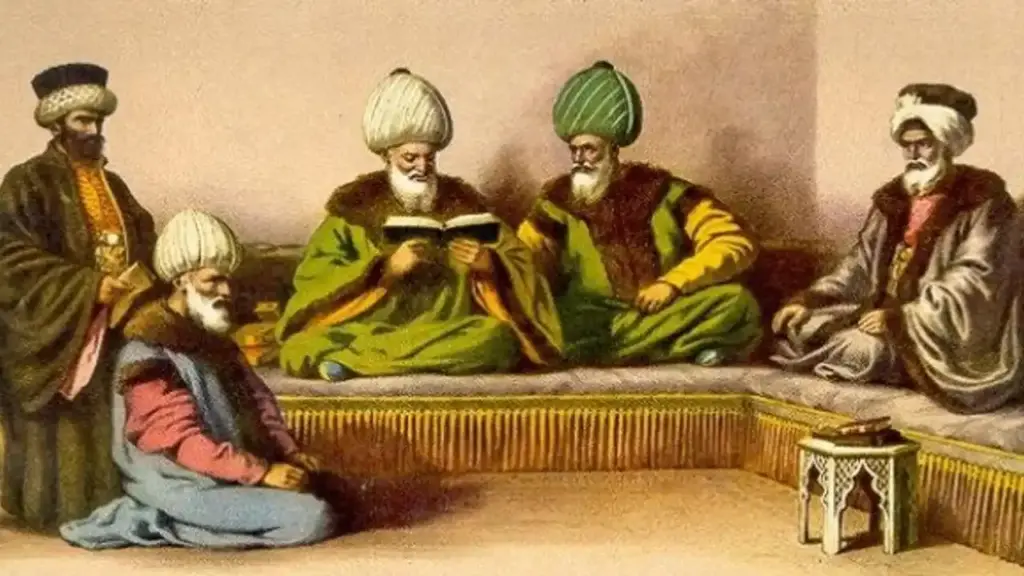The Ottoman Empire has laid the foundations of an important civilization with its expansion and influence throughout history. Law in the Ottoman Empire; this great empire left deep traces not only on its lands but also in the field of justice and law. The legal system of the Ottoman Empire was shaped under the influence of Sharia Law, which is Islamic law, and over time it developed to include local customs and practices. This system became a model not only for the internal functioning of Ottoman society, but also for governing people from different religions and cultures.
The foundations of the legal system in the Ottoman Empire lie in the combination of Sharia Law, based on the teachings of Islam, and the Kanun-i Esasi, based on local customs and practices. Sharia Law includes Islamic legal rules derived from the Quran and Hadith, while the Kanuni Esasi is considered the fundamental legal text of the Ottoman Empire. This document was shaped in line with the expansion of the Ottoman Empire and its need to govern different communities. Therefore, the legal system in the Ottoman Empire is both based on the principles of Islamic law and also reflects the influence of local customs and practices.
The provision of justice was one of the most fundamental goals of the Ottoman State. Ensuring justice was of vital importance for the stability of the state and the peace of society. For this reason, the Ottoman State’s justice system had a centralized structure. The Sultan, as the highest authority, was responsible for the provision of justice and shared this duty with important officials such as Grand Viziers, Judges and Sheikhs-ul-Islams. Judges were responsible for resolving legal disputes and representing justice in local courts. The Sheikhs-ul-Islam issued fatwas on religious matters and supervised the implementation of Islamic law.
While this system reflected the diversity and complexity of Ottoman society, it played an important role in ensuring justice and maintaining social order.
Fundamentals of Law in the Ottoman Empire
The foundations of the legal system in the Ottoman Empire have evolved throughout history and have been shaped by different cultural influences. These foundations have developed under the influence of Sharia Law, which is Islamic law, since the foundation of the Ottoman Empire. Sharia Law included legal principles derived from the sacred texts of Islam, and these principles formed the main structure of the legal system in the Ottoman Empire since the foundation of the state. Sharia Law, which was shaped by the interpretation of the Quran and Hadith, played a fundamental role in ensuring justice and maintaining social order.
However, the expansion of the Ottoman Empire and the need to govern people from different cultures and religions made it necessary for the legal system to be based solely on Islamic law. Therefore, the Ottoman legal system developed over time under the influence of local customs and traditions. The document called Kanun-i Esasi is a reflection of this synthesis. Kanun-i Esasi was accepted as the fundamental legal text of the Ottoman Empire and represents the combination of Islamic law and local customs. This document reflects the multicultural and diverse structure of the Ottoman legal system.
Another important element that formed the basis of the legal system in the Ottoman Empire was the schools of jurisprudence. The schools of jurisprudence represent different schools of interpretation of Sharia law, and law was practiced under the influence of different schools in different regions of the Ottoman Empire. The Hanafi, Shafi’i, Maliki and Hanbali schools formed the basis of the Ottoman legal system, and justice was distributed according to the interpretations of these schools.
In this way, the Ottoman legal system was based on the principles of Islamic law while also incorporating local customs and traditions. This complex and multi-layered structure was an important foundation for the long-term existence and expansion of the Ottoman Empire. The Ottoman legal system played a vital role in ensuring justice and maintaining order in society, and developed and evolved at various periods throughout history.
Law and Justice System in the Ottoman Empire
The legal and justice system in the Ottoman Empire had a complex structure that was carried out by various institutions to ensure the peace of society and played an important role in the administration of the Ottoman Empire. The provision of justice was of vital importance for the stability of the state and the welfare of society, and therefore the Ottoman Empire established various institutions and mechanisms for the establishment of justice.
One of the most important elements of the law and justice system in the Ottoman Empire was that the Sultan was responsible for the provision of justice as the highest authority. The Sultan was considered the source of justice as the ruler at the top of the state. The Sultan worked with important authorities such as the Grand Viziers, Judges and Sheikhs-ul-Islams to ensure justice and maintain order in society.
The Grand Vizier served as the Sultan’s right-hand man and was responsible for the administration of the state. The Grand Vizier played an important role in ensuring justice and enforcing the law. The judges were one of the cornerstones of the Ottoman Empire’s legal system. The judges were responsible for resolving legal disputes and representing justice in local courts. The judges were generally trained and appointed according to the schools of jurisprudence and took great care to ensure justice was provided.
The Sheikh al-Islam also had an important role in the Ottoman Justice System. The Sheikh al-Islam issued fatwas on religious matters and supervised the implementation of Islamic law. The fatwas of the Sheikh al-Islam could influence the legal structure of the Ottoman Empire and were considered an important source of guidance for the provision of justice.
The legal and justice system in the Ottoman Empire had a centralized structure and various institutions and mechanisms worked together to ensure justice. This system played an important role in ensuring the stability of the state and the peace of society. The complexity and efficiency of the Ottoman Justice System supported the long-term existence and expansion of the state.

Ottoman Criminal Law
Ottoman Criminal Law was an important part of the justice system of the Ottoman Empire and included various legal regulations for the preservation of social order, punishment of crimes and provision of justice. This legal system was shaped under the influence of Islamic law, Sharia Law, and was based on Islamic principles in determining crimes and punishments.
The basis of Ottoman Criminal Law was Islamic law, Sharia Law. Sharia Law included Islamic legal rules derived from the Quran and Hadith, and was based on the schools of jurisprudence that were formed by interpreting these rules. These principles were effective in various areas, from defining crimes to determining punishments. For example, crimes such as theft, murder, and adultery were defined by Sharia Law and the punishments for these crimes were determined.
Important officials such as judges and sheikhs al-Islams played a role in the implementation of Ottoman criminal law. The judges were responsible for resolving criminal cases in local courts and determining punishments. The sheikhs al-Islam issued fatwas on religious matters and supervised the implementation of Islamic law. These officials played an important role in the implementation of criminal laws and worked to ensure justice.
Another important feature of Ottoman Criminal Law was the wide discretionary power in determining the punishments. The punishments could vary according to the seriousness of the crime, the way it was committed and the social norms. Therefore, the discretionary power of the lawyers and the authorities was of great importance in the application of the criminal laws. In addition, the punishments were generally determined by the local courts where the crime was committed, while there was also the possibility of appeal or appeal to different levels of jurisdiction.
Ottoman Criminal Law served as an important tool for the provision of justice and the preservation of social order. However, this legal system changed and evolved over time, especially with the establishment of Western-style criminal laws and courts with the reforms made during the Tanzimat Period. These changes contributed to the more effective provision of justice during the modernization process of the Ottoman Empire.
As a result, the legal system in the Ottoman Empire played an important role in terms of providing justice and maintaining social order. This legal system, which is a synthesis of Sharia Law and the Kanun-i Esasi, has a structure that reflects the diverse cultural and religious backgrounds of Ottoman society. This system has been an important foundation for the long-term existence and expansion of the Ottoman Empire.
